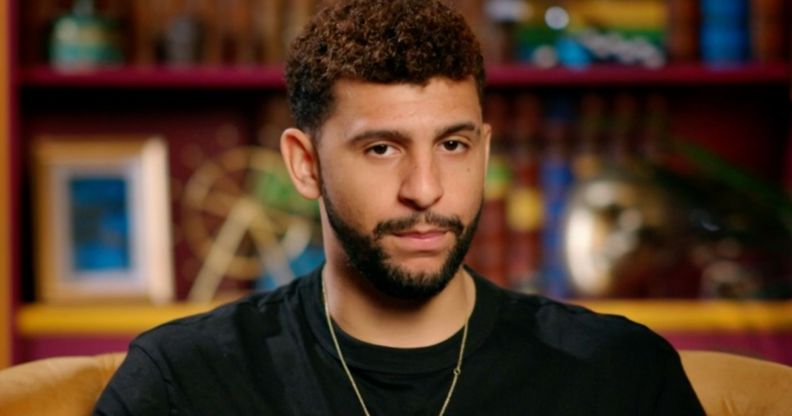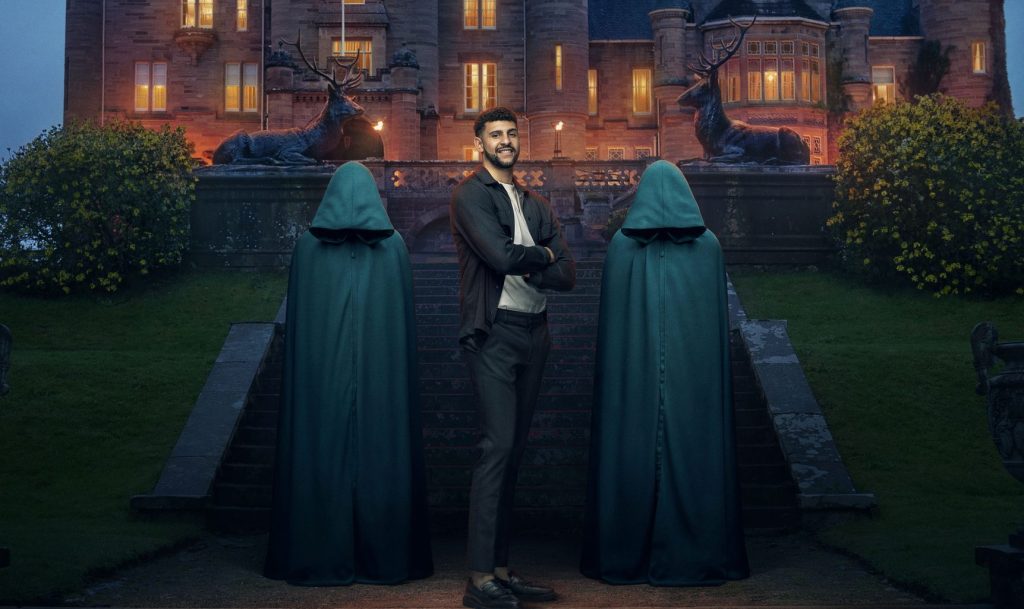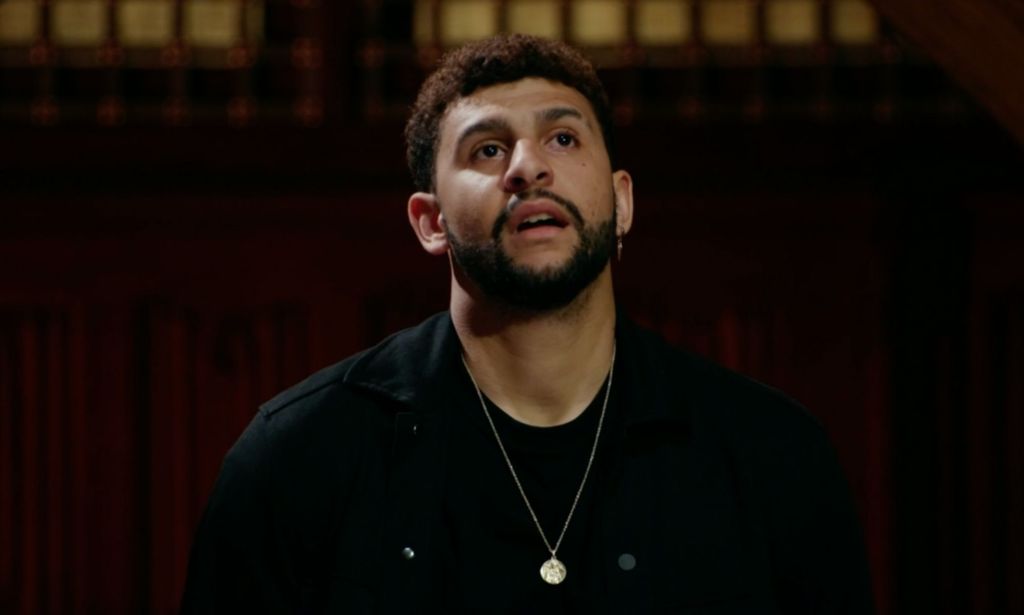‘I was a contestant on The Traitors. Here are five things I learnt about the game’

Theo from The Traitors season one. (BBC)
The Traitors is back on UK television with a bang. Only a handful of episodes into the second series, and already we’ve witnessed banishments, breakdowns and Claudia Winkleman’s bangs.
Oh, and spoiler alert, in episode three, viewers watched with open mouths as the endlessly suspicious, pristinely bobbed Diane revealed that fellow faithful Ross is actually her son.
The upcoming episodes, which air on BBC One and iPlayer, look set to be filled with more emotions, more murder and, hopefully, more Winkleman turtlenecks.
But if the faithfuls truly want to catch a traitor, there are a few things they need to take on board. Season one star and gay cheerleading coach Theo Mayne, who made it all the way to episode nine as a faithful, has shared some of his first-hand wisdom with PinkNews.

The best way to play the game? Don’t play the game
“I think the best way to play the game is not to play the game,” says Theo, who reckons that over-analysing a situation is “100 per cent” what causes the downfall for most faithfuls, who end up being banished.
“When you start to play the game, you definitely get more on the traitors’ radar, because [they’re] then like, ‘Well, he’s starting to try and play and starting to work it out’.
“Whereas if you notice, me [and fellow faithfuls and eventual winners] Meryl, Hannah, we didn’t really play that much. We just showed up and had a good day, which obviously worked in their favour, because they’re 50 grand up.”
In episode nine, Theo fell victim to the round-table room, after he came up with an elaborate, and false, reason as to why faithful Aaron was a traitor.
“I obviously came out with all of my detective Clouseau ideas and scenarios, and it backfired on [me]. I should have thrown Maddy under the bus and been like: ‘She just lied about being an actress’. But I’m not that person.”
Find a balance between speaking up and staying quiet during the roundtable
“I stayed away from going in at people,” Theo says of how he approached the nerve-shredding round-table discussions.
“I didn’t really speak a lot at the roundtable just because I state my facts, I try to have my own reasoning on everybody, and I always used to say to every cast member in there: I’m making my own opinion upon everybody. I don’t want to copy the herd.”
Sometimes, Theo remembers, he would simply shrug and say he had no reason to accuse anyone of being a traitor. However, if you stay too quiet during the discussion, that can also leave you susceptible to being banished.
“At the end of the day, you’ve got to find the traitor to get out. I think the weaker players who are not putting in any effort, or not doing as much as everybody else [to try to find traitors out], people are just gonna be like: ‘Well, that’s an easy one to get rid of’, which is what we did at the first couple of roundtables.
“Nobody had an idea, so we just went for the ones we’d not connected with the most.”
Being murdered is better than being banished
For viewers, watching the faithfuls getting unceremoniously murdered by the traitors in the middle of the night and leaving the show instantly, instead of seeing them fight their case in the round-table discussion, sucks.
Theo thought it would suck too, and thought he’d prefer to be banished rather than murdered – until the he was actually banished.
“My banishment was one of the toughest for everybody. I said I’d rather be banished so I could stand up for myself, but after that one, nope, murder me, I’d happily go. It was really tough,” he admits.

It’s all down to the room in which the roundtable is set that makes it such a horrific experience.
“That room… it’s demonic in there. It’s cold, it’s because it’s set in a church. It just feels horrible. You can hear a pin drop.
“It adds extra pressure because the set-up of everything in there makes you quite nervous. I think that’s why so many people crack in there because it’s such a pressure cooker. It’s a ticking bomb.”
The Traitors is a place to make friends for life
“We’re still in a WhatsApp group together, we still all chat,” Theo says of his season one cast mates.
“I see [winner] Hannah a lot. I see [traitor] Alyssa a lot. Hannah and I have been on holiday. A couple of us went to Amsterdam together in May.
“That’s a good thing about this cast. We all get along. We all support one another. If there’s something that we’re doing, we invite one another to it, we all ask how we’re doing and what’s new for us.
“I’ve created friendship through something I never thought I would gain friends from.”
Season two has an expert traitor, a would-be-brilliant traitor, and a traitor who is about to crack
Having experienced The Traitors in its chaotic entirety, Theo knows a good, a bad, and a would-be-brilliant traitor when he sees them.
“Body language is a massive thing. You can see when somebody’s nervous, especially around the round table,” he says.
“The only person who’s scarily good at [being a traitor] is Paul. He’s just fantastic. You cannot tell a thing.”
However, the other traitors are giving their game away, Theo believes.
“If you watch Ash, even Harry sometimes, and Miles, they just look so nervous. Ash probably the most, she looks like she’s just gonna crumble.”
But there’s one person who Theo thinks should have been chosen to become a traitor.
“One person who’s standing out to me at the moment is Diane. She’s funny, she’s iconic, she’s absolutely legendary. She’s not taking any rubbish. I hope they don’t kill her off for that reason, because she is a massive threat to the traitors. She’s brutal.
“She’d have been a fantastic traitor, I think she’s played a blinder.”
The Traitors season two is streaming now on BBC iPlayer and continues at 9pm on Wednesdays, Thursdays and Fridays on BBC One.
How did this story make you feel?
